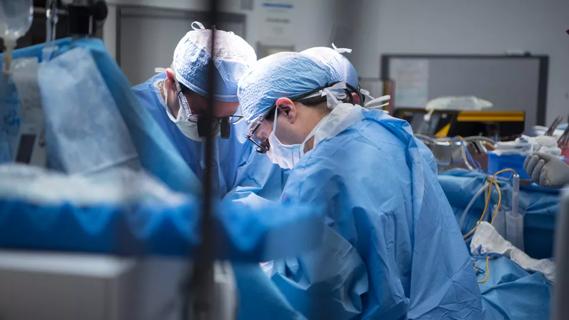Unique molecular features found in young-onset disease

There has been an alarming rise in colorectal cancer among people age 50 and younger. This trend spurred researchers at Cleveland Clinic’s Taussig Cancer Institute, Digestive Disease and Surgery Institute and Lerner Research Institute to delve into the etiology of the disease. Several research teams are working together on parallel projects to better understand the rising incidence rate.
Advertisement
Cleveland Clinic is a non-profit academic medical center. Advertising on our site helps support our mission. We do not endorse non-Cleveland Clinic products or services. Policy
Cleveland Clinic Internal Medicine Resident Hareem Syed recently presented data at the American College of Gastroenterology Scientific Meeting showing that 20% of patients with early-onset colorectal cancer (defined as age 50 or younger) seen at Cleveland Clinic between 2010 and 2019 were found to have a germline pathogenic variant (mutation). Lynch syndrome and familial adenomatous polyposis were the most common hereditary colorectal cancer syndromes detected in this population.
“While this data stresses the importance of germline genetic testing in early-onset colorectal cancer patients, it also again shows that the majority of these cancers are not due to a hereditary cancer syndrome,” says David Liska, MD, a colorectal surgeon and Director of the Cleveland Clinic Center for Young-Onset Colorectal Cancer. “Understanding the drivers for the rise in early-onset colorectal cancer without a known germline pathogenic variant is a critical first step to allow for improved treatments and prevention.”
Some studies indicate that tumors in early-onset colorectal cancer (eoCRC) patients have more aggressive biology, but to date the evidence is conflicting and contributing factors are poorly understood. Although recent papers indicate that there is no major difference in the genomic landscape between early- and “average” onset disease (defined as age 60 or older), many questions remain: What are the drivers of colorectal cancer in young people? Does the disease differ from traditional average age-of-onset disease beyond accelerated carcinogenesis? And what are the appropriate screening and treatment methods?
Advertisement
“Despite the significant increase in incidence of early-onset colorectal cancer over several decades, we still know very little about what is causing this trend,” says Suneel Kamath, MD, a GI medical oncologist and researcher at Cleveland Clinic. “We believe it is some environmental exposure, such as diet, sedentary lifestyle or excessive antibiotic use, but there is still so much to learn.”
Using data and specimens from its Colorectal and Liver Tumor Bank, Cleveland Clinic researchers are conducting numerous molecular studies, with a focus on metabolomic, microbiome and immune factors that play important roles in the tumor microenvironment. “We are leading a full-court press effort to grasp all of the underlying factors that is driving the rise in early-onset colorectal cancer, including metabolomics, microbiomics and geospatial epidemiology,” says Alok A. Khorana, MD, who directs the GI Cancer Program at Cleveland Clinic and has been leading the Clinic’s research efforts in this area.
Cleveland Clinic Hematology/Oncology Fellow Thejus Jayakrishnan, MD, was recognized by ASCO with the 2023 Gastrointestinal Cancers Symposium Conquer Cancer Merit Award for his research examining metabolomic differences between early onset (eoCRC) and average onset (aoCRC) cases.
The goal of the study was to evaluate if the metabolomics or metabolism of patients who develop colorectal cancer at a younger age are distinct from those who develop it at a later age. If researchers can identify signatures that suggest certain environmental factors or other differences, that data could be used to develop better screening, prognostic and treatment strategies.
Advertisement
“We believe the increase in early-onset disease may be related to deleterious environmental exposures,” says Dr. Jayakrishnan. “Whether that’s due to diet, lifestyle, environmental or other factors, we don’t yet know.”
One surprising study finding was that the metabolite citrate appeared to be present in higher levels in patients that developed cancer at a later age compared to young. “We already know that citrate cycle alterations are associated with more aggressive disease and that patients with this alteration are less responsive to standard treatments, so the data indicates that there may be more metabolic alteration in younger patients, resulting in lower levels,” says Dr. Jayakrishnan.
Researchers would like to understand what is causing these pathway-level changes and specifically what enzymes in the body are altered as a result.
Another significant finding was that arginine biosynthesis was one of the most highly enriched pathways altered in patients with eoCRC. Red meat consumption, which is a known risk factor for colorectal cancer, has been linked to this pathway, so the researchers hope to further explore whether metabolic changes related to red meat consumption are more pronounced in younger patients who develop cancer and why. Carbohydrate biosynthesis pathways were also altered in younger patients, making it clear that there are metabolic differences in the diseases of young vs. average-age patients.
Dr. Jayakrishnan noted that the research results are preliminary, and should be built upon with validation and mechanistic studies.
Advertisement
In another study presented at the ASCO Gastrointestinal Cancers Symposium, researchers found distinctions in the immune T-cell repertoire between patients with eoCRC and aoCRC. The researchers did not observe differences in the extent of T-cell infiltration into tumors but in the range of T cells that are important to recognize and kill tumor cells. eoCRC tumors had higher T-cell variability compared to aoCRC tumors in a multivariable model, adjusting for sex, race, tumor location and stage. This association was replicated in a large population-based epidemiological study.
The hope is that this foundational research will further efforts to better understand whether there are differences in the immune responses of young adults with colorectal cancer. “There is still debate as to whether this is the same molecular disease in early-onset cases or if there are different pathways by which the disease is developing,” says study co-author Stephanie Schmit, PhD. “There is a whole tumor microenvironment to explore to give us clues, such as unique aspects of the metabolome, microbiome and proteome as well as the ability of a person’s immune response to react to tumors. We don’t yet know if or why certain young people may not be able to mount a strong and effective immune response to these cancer cells.”
For this study, researchers determined that the types of T cells that recognize a tumor are quite different in eoCRC, but the implications of this remain unclear. “There may be some difference between early and older-onset cases in the way their immune systems are able to recognize and respond to a developing tumor,” says Dr. Schmit. “It’s possible that younger adults have enough T cells but they don’t have as robust an ability to attack the tumor.”
Advertisement
If researchers can identify distinct immune-related biomarkers, they will be able to better understand who needs to be screened earlier, and potentially be able to identify immunoprevention or treatment modalities that might work more effectively for this population.
In addition to these studies, there is much active work underway at Cleveland Clinic to better understand the drivers of eoCRC. Shimoli Barot, MD, and Kanika Nair, MD, are leading efforts to examine microbiome differences in the disease. Also, Blake Buchalter, PhD, is a postdoctoral fellow in Dr. Schmit’s lab who is leading the way in understanding geospatial patterns of eoCRC in the U.S.
A next step is to gather learnings from Cleveland Clinic’s different metagenome, metabolome, microbiome, immune and genome studies. Cleveland Clinic’s team of bioinformaticians can serve to further this work, integrating these study findings together and considering opportunities to apply machine learning to gain further insights. Ultimately, this data can be used to develop signatures to screen patients at higher CRC risk and develop better intervention strategies.
Learn more in our podcast episode about metabolic differences between young-onset and early-onset colorectal cancer.
Advertisement

Key points highlight the critical role of surveillance, as well as opportunities for further advancement in genetic counseling

Simple score uses clinical factors to identify patients who might benefit from earlier screening

Radiation to the pelvis from cancer treatment made the traditional treatment path unavailable

Insights indicate that treatment may be beneficial beyond MSI-H tumors

Surgery, chemotherapy improve outcomes among EOCRC patients

ctDNA should be incorporated into care to help stratify risk pre-operatively and for post-operative surveillance

Greater awareness among young patients is needed

Although the number of surgeon-scientists in colorectal surgery is small, a Cleveland Clinic colorectal surgeon-scientist shares his thoughts on what surgeon-scientists bring to the table